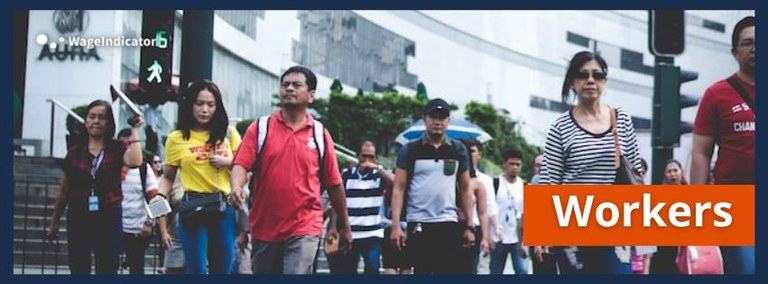WAGEINDICATOR & GIG 2023: WHAT A YEAR!
Dear reader,
As we come to the end of the year, the WageIndicator Gig team wants to thank you for your support.
Your interest in this project has kept us going, and we hope more supporters like you will come forward in the future.
In 2023, the WageIndicator Gig team has been highly active, and many projects have been underway.
In March, we launched Gigpedia in collaboration with Fairwork and the Leeds Index.
Gigpedia is designed to provide an overview of available information about the global platform economy, including news, court cases, regulation, good practices, collective agreements, labour standards, visuals, and blogs.
WageIndicator has been researching developments in the global labour market for 24 years. Access to clear and transparent information is crucial for workers, policymakers, and social partners to make better decisions.
To help them in the endeavor, we commit to sharing up-to-date and relevant information over the coming year, and we hope you’ll be part of this journey.
Read the compilation of blogs from WageIndicator, Fairwork, and Leeds Index.
It has been three years since we hosted our first Gig webinar. Since then, we have held two webinars every year focusing on different topics of the platform economy: regulatory practices, migration and telemigration, and domestic platform work.
Looking back at the past year, Women in Gig Work: Web-Based Work in March had 330 participants, and A Level Playing Field for Gig Workers in October saw 287 participants.
We are excited to announce that our upcoming event, scheduled for 22nd March 2024, will focus on the redistribution of work for freelancers worldwide.
We’ll try to overcome the Global North perspective that looks suspiciously at freelancers entering the global labour market via platforms.
To pursue this goal, we’ll explore the opportunities for freelancers in the Global South and animate the debate by learning from the context of these developments.
This webinar will be broadcast live from the International Conference on Corporate Social Responsibility and Decent Work in the Era of Sustainable Development Goals, taking place in Pune (India) between the 21st and 23rd of March 2024.
WageIndicator and FLAME University are organising this event to assess how corporations can catalyse the achievement of SDGs and how decent work can be placed at the centre of agendas in the global platform economy, too.
Learn more about the conference.
As we told you in our latest communications, at the end of November, a panel of experts discussed the potential of the Living Tariff tool that WageIndicator has developed in partnership with GIZ, the German Development Cooperation.
This tool has been developed to help gig workers calculate fair wages based on accurate cost of living information and hidden and indirect costs like waiting times, cancellation fees, and non-payment by clients. It will also provide them with information about relevant labour laws, vacation days, standard working hours, and more.
The living tariff tool is being piloted in Pakistan, Kenya, and Indonesia in close cooperation with the Centre for Labour Research and WageIndicator teams.
As Pooja Gianchandani (GIZ) remarked at the presentation event, “The living tariff tool is not just a practical tool for workers and their allies, but also a powerful tool for ensuring agile regulation. In many countries, workers face unique barriers and find it hard to unionize. So this is a first step to a longer journey.”
If you want to learn more, feel free to contact us. Write to paulienosse@wageindicator.org.
Watch the video Introduction to the Living Tariff Tool.
Let’s continue with this recap and mention the eight episodes of The Gig Work Podcast that global platform Martijn Arets produced and edited to address the global issues in the platform economy.
If you missed the podcast and didn’t know where to start, we suggest you catch up by listening to the interview with Paulien Osse, co-founder of WageIndicator, and the Foundation’s commitment to providing workers with the correct information about income and rights.
Next, you can learn how the former Uber driver James Farrar has been fighting platforms before the courts for years. He is working to equalize the balance of power by analyzing drivers' data and uniting platform workers in the Worker Info Exchange and the App Drivers and Couriers Union.
Martijn Arets also had a conversation with Magalí Gurman (Glovo) about riders’ employment status. With the Couriers Pledge, the company promises delivery workers safety, community, equality, and a fair income in 21 countries. Why, how does it work, and what does a platform worker get out of it?
Find the complete episode collection in the podcast section on Gigpedia.
We are grateful for all the interns who worked with our team throughout the year: 30 Flame interns, three Ahmedabad interns, one global intern, and two interns from Bucharest filled our database with news from different countries worldwide, produced some incredible visuals, and wrote blogs that are now available on Gigpedia.
Thanks to their hard work, our news database now covers around 60 countries.
We hope this experience will benefit them in the future, and we look forward to working with more interns from January onwards.
More details on the WageIndicator Internship Program
To end on a high note, we also released Economía Gig, the Spanish monthly gig newsletter focusing on Latin America, in November.
Aware that there is nothing similar for the Spanish-speaking audience, we collect news from the region and share good practices that benefit workers.
An example comes from Nippy: as a worker tech platform, Nippy offers services to gig workers and monitors their activity to improve it.
Recently, we announced a collaboration to combine this dataset with WageIndicator’s wage database and the Living Tariff tool.
We hope to strengthen the efforts and enhance workers’ productivity and earnings.
Subscribe to Economía Gig or share it with your Spanish-speaking colleagues.
That’s all, dear reader.
This newsletter is not only a summary of our goals but also a demonstration that if we have succeeded, it is thanks to the people who follow us.
We want WageIndicator to be a safe space to discuss the platform economy's setbacks and opportunities.
We aim to expand this project and facilitate constructive and meaningful discussions among workers, academics, and platforms.
Trusting in your support and looking forward to your feedback, we wish you a nice day and a fantastic year.
The WageIndicator Gig team
WHAT’S NEW ON GIGPEDIA
From Ouishare to WorkerTech: A Look Back and Forward at Platforms and the World of Work
“When it comes to platform work, the biggest problem is the skewed power relationship between the platform and the platform workers,” Albert Cañigueral Bagó told Martijn Arets in the latest episode of The Gig Work Podcast.
Cañigueral started the first Spanish blog on the sharing economy in 2011 and then wrote a book on macroeconomic trends and their impact on labour: El trabajo ya no es lo que era ('Work is not what it used to be').
"Platforms provide structured access to fragmented and often invisible work," he explains. "But if the conditions in doing so are not clear or if you cannot influence them, you feel like a slave to the platform."
How did the sharing and gig economy develop? And what impact does technology have on workers now and in the future?
This is what Martijn Arets discusses with Albert Cañigueral Bagó in The Gig Work Podcast.
If you missed any podcast episodes, you can find them in the Podcast section on Gigpedia.

Argentina - The Buenos Aires province sanctioned PedidosYa, forcing the company to refund the money charged to users in Buenos Aires as a "service fee."
Australia - More than 900 bicycle and motorbike delivery workers have suffered injuries in Victoria in the past seven years. Considering that gig workers’ injuries are not always reported as they are independent contractors, these statistics might give a rare insight into the phenomenon.
Belgium - A Brussels Labour Court overturned an earlier judgment and ruled that Deliveroo couriers should be classed as employees.
France - Uber, Bolt, and Free Now agreed to raise drivers’ pay per trip to a minimum of 9 euros (9.85 dollars), up from 7.65 euros.
India - The Telangana Gig and Platform Workers’ Union has urged the government to tighten its hold on illegal bike taxis, which severely impact auto-rickshaws and taxi drivers.
Spain - Glovo has claimed that it is "unnecessary" for riders to activate location during orders and that the company does not require this information to determine and pay waiting time. Unions replied that riders must turn the GPS on to be assigned orders.
Remember that…
Spain's 2021 'Rider Law', designed by the Minister of Labour, Yolanda Díaz, establishes that platform workers are not self-employed but employees.
US - Thanks to an ongoing investigation by the Department of Consumer and Worker Protection, a group of riders in New York City received checks to make up for the 22,000 dollars DoorDash failed to pay them for their work.
EU Directive Updates
European Union member states, led by France, have rejected the provisional deal struck on December 13, 2023, that set new rules on platform workers’ employment status.
The issue was sent back for further negotiations with the European Parliament.

India
- Uber unveiled its latest feature, “Round Trip,” allowing passengers to book single- or multi-day return trips for outstation travel while maintaining the same car and driver for the entire duration.
- Food and delivery platform Swiggy is introducing a 2 percent collection fee on all restaurant orders to facilitate online customer payments.
- Electric vehicle ride-hailing startup BluSmart has raised 24 million dollars, or around 200 crore rupees, in fresh capital from some of its existing investors.
- inDrive has recently experienced a significant surge in driver registrations.
Did you know? A cab driver in Bengaluru, Mr. Lokesh, has launched his own ride-hailing app to compete with industry giants Uber and Ola.
Indonesia
- Gojek and Grab are catching up with taxi and delivery drivers using electric vehicles.
- inDrive, Maxim, and other players are taking up the markets left behind or not penetrated by Gojek and Grab.
Nigeria - Jumia is shuttering its food delivery service, Jumia Food, across its operating countries, including Nigeria, Kenya, Morocco, Ivory Coast, Tunisia, Uganda, and Algeria, by the end of December 2023.
Philippines - The motorcycle ride-hailing service provider Angkas is targeting to launch significant updates on its mobile application by next year.
South Africa - Bolt has introduced new in-app security features in an effort to beef up security.
Taiwan - Uber Eats announced a program aiming to simplify and reduce costs for delivery partners transitioning to electric scooters.
The Netherlands - Uber Eats partnered with Gorillas, and users can now order groceries on the Gorillas application.
Did you know? Delivery Hero will close its global tech hubs in Turkey and Taiwan.
UK - Under the collaboration between Just Eat and Morrisons, shoppers will be able to buy thousands of products from their local convenience stores for delivery via the Just Eat app.

Report: Currently, Belgian riders earn 4.42 euros net per delivery in Brussels. The Collectif des Coursiers Bruxelles explained that the scarce pay forces riders and drivers to work 60 to 80 hours per week since the waiting time between deliveries is unpaid. Fatigue contributes to road accidents, and self-employed delivery drivers are only provided with minimal cover via an insurance policy taken out by the platforms.
Colombia - Unidapp union delegates met in Bogotà to vote for the Pliego de Peticiones, a set of demands to present to the food delivery platform Didi.
Germany - Delivery Hero adjusted the headcount at its headquarters in Berlin.
Italy
- Riders protested against dismissals following the MyMenu closure. Despite the agreement with Just Eat, the companies didn’t guarantee jobs for former MyMenu workers.
- Glovo riders in Florence denounced being victims of robberies.
- The Appeal Court of Bologna condemned Deliveroo for forcing riders to accept the Assodelivery and UGL National Collective Agreement under threat of dismissal. In 2020, the Italian Ministry of Labour stated that the UGL union does not sufficiently represent Italy's delivery workers; for this reason, the agreement was declared “illegitimate.”
- USB rejoiced that Uber removed a service fee added as an overprice and asked the platform to refund clients.
Nigeria - Bolt opened up on the dispute with the Amalgamated Union of App-based Transporters of Nigeria.
Spain - The Sindicato Libre de Transportes (SLT) has called a strike at Cabify subsidiaries in Madrid amid the Christmas season. They accused the platform of not paying overtime.
Did you know? Account rentals are the order of the day in the delivery sector in Zaragoza, as in many other Spanish towns. Most riders work as independent contractors and rent their accounts to foreign colleagues without work permits. In its terms and conditions, Glovo states that riders have the faculty to “decide whether to subcontract their own accounts without such notification implying any assumption of liability on the part of Glovo".
US
- Thanks to the Independent Drivers Guild initiative, New York City drivers gathered at LaGuardia Airport to receive assistance for deactivation, accidents, and other on-the-job issues.
- Chicago Uber and Lyft drivers took action to demand fair pay, safety on the job, and an end to unfair deactivations.
Vietnam - Grab drivers reported being bullied by non-platform drivers who wear Grab uniforms to win customers’ trust.

India
- Nearly three months after announcing an insurance scheme for platform-based gig-economy workers across Karnataka, the state labour department ordered labour commissioners and inspectors in all districts to start enrolment of beneficiaries for the scheme that provides insurance cover of up to 2 lakh rupees.
- The Telangana government has announced health insurance of 10 lakh rupees and accident insurance of 5 lakh rupees for gig workers.
Japan - Amid a taxi driver shortage, Japan is set to partially lift its ride-hailing services ban starting next April.
Spain - To establish a balance between customers and platforms using transport vehicles with drivers (VTC), the Government of Isabel Díaz Ayuso has established that trip costs can’t exceed 75 percent of the ordinary prices in high demand. The final approval and entry into force are expected in early 2024.
US - After months of meetings, Minnesota’s task force on Uber and Lyft failed to reach an agreement on minimum wage for drivers. Gov. Tim Walz created the task force in May after he issued the first and only veto of his tenure on a bill that would have set minimum pay for drivers and granted them protections against wrongful deactivation.

Argentina - A judge in Río Grande declared unconstitutional Ordinance 3548 that prohibits public and private urban passenger transport services when using computer programs or systems.
Brazil - The 3rd Labor Court of Campo Grande in Mato Grosso recognized the employment relationship between iFood and one of its drivers. iFood claimed that it only mediated contact between customers and restaurants. Still, the judge found it invalid, as the contract itself makes it clear that the “logistics operator” would work to “provide delivery services intermediated by iFood.”
Mexico - Companies like DiDi, Rappi, and Uber Eats have expressed concerns about a possible ruling by the Supreme Court of Justice of the Nation (SCJN) related to the 2 percent tax on platform commissions for using the Mexico City infrastructure. “This tax is discriminatory,” they said in a note.



